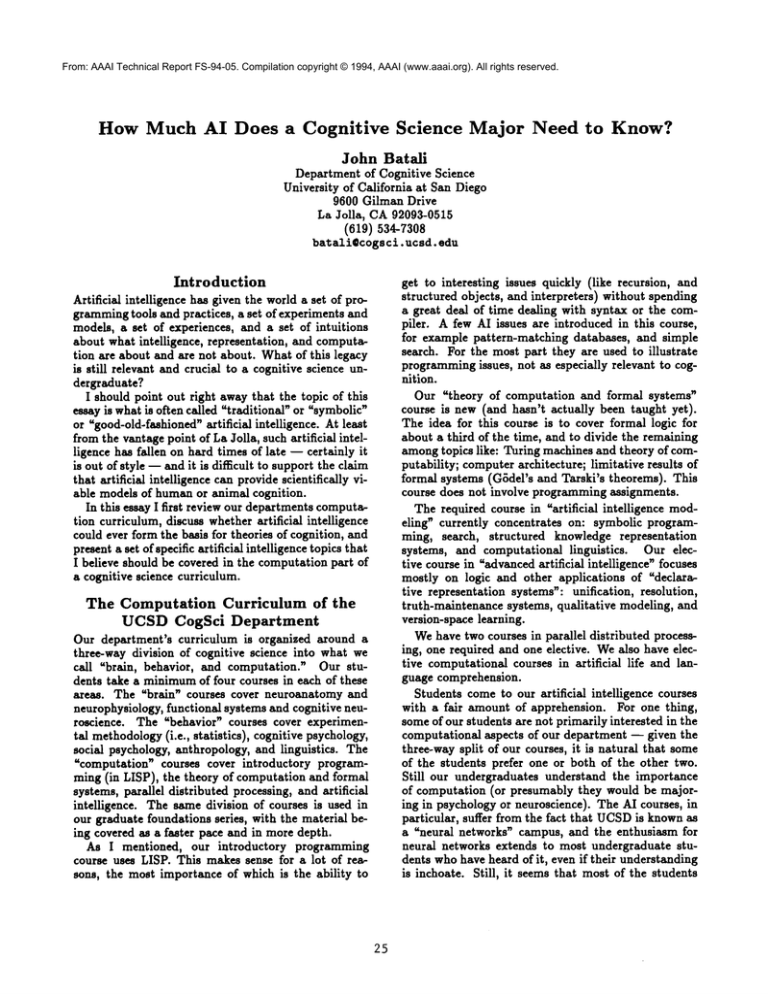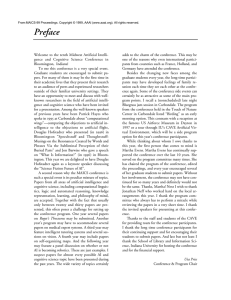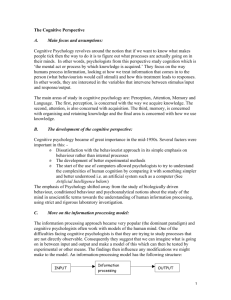
From: AAAI Technical Report FS-94-05. Compilation copyright © 1994, AAAI (www.aaai.org). All rights reserved.
How Much AI Does a Cognitive
Science
Major Need to Know?
John Batali
Department of Cognitive Science
University of California at San Diego
9600 Gilman Drive
La Jolla, CA92093-0515
(619) 534-7308
batali@cogsci.ucsd,
edu
Introduction
get to interesting issues quickly (like recursion, and
structured objects, and interpreters) without spending
a great deal of time dealing with syntax or the compiler. A few AI issues are introduced in this course,
for example pattern-matching databases, and simple
search. For the most part they are used to illustrate
programmingissues, not as especially relevant to cognition.
Our "theory of computation and formal systems"
course is new (and hasn’t actually been taught yet).
The idea for this course is to cover formal logic for
about a third of the time, and to divide the remaining
amongtopics like: Turing machines and theory of computability; computerarchitecture; limitative results of
formal systems (G6del’s and Tarski’s theorems). This
course does not involve programming assignments.
The required course in "artificial intelligence modeling" currently concentrates on: symbolic programming, search, structured knowledge representation
systems, and computational linguistics.
Our elective course in "advancedartificial intelligence" focuses
mostly on logic and other applications of "declarative representation systems": unification, resolution,
truth-maintenance systems, qualitative modeling, and
version-space learning.
Wehave two courses in parallel distributed processing, one required and one elective. Wealso have elective computational courses in artificial life and language comprehension.
Students cometo our artificial intelligence courses
with a fair amount of apprehension. For one thing,
someof our students are not primarily interested in the
computational aspects of our department -- given the
three-way split of our courses, it is natural that some
of the students prefer one or both of the other two.
Still our undergraduates understand the importance
of computation (or presumably they would be majoring in psychology or neuroscience). The AI courses, in
particular, suffer from the fact that UCSDis knownas
a "neural networks" campus, and the enthusiasm for
neural networks extends to most undergraduate students whohave heard of it, even if their understanding
is inchoate. Still, it seems that most of the students
Artificial intelligence has given the world a set of programmingtools and practices, a set of experiments and
models, a set of experiences, and a set of intuitions
about what intelligence, representation, and computation are about and are not about. What of this legacy
is still relevant and crucial to a cognitive science undergraduate?
I should point out right away that the topic of this
essay is what is often called "traditional" or "symbolic"
or "good-old-fashioned" artificial intelligence. At least
from the vantage point of La Jolla, such artificial intelligence has fallen on hard times of late -- certainly it
is out of style -- and it is di~cult to support the claim
that artificial intelligence can provide scientifically viable models of humanor animal cognition.
In this essay I first review our departments computation curriculum, discuss whether artificial intelligence
could ever form the basis for theories of cognition, and
present a set of specific artificial intelligence topics that
I believe should be covered in the computation part of
a cognitive science curriculum.
The Computation Curriculum of the
UCSD CogSci Department
Our department’s curriculum is organized around a
three-way division of cognitive science into what we
call %rain, behavior, and computation." Our students take a minimumof four courses in each of these
areas. The "brain" courses cover neuroanatomy and
neurophysiology, functional systems and cognitive neuroscience. The "behavior" courses cover experimental methodology(i.e., statistics), cognitive psychology,
social psychology, anthropology, and linguistics. The
"computation" courses cover introductory programming (in LISP), the theory of computation and formal
systems, parallel distributed processing, and artificial
intelligence. The same division of courses is used in
our graduate foundations series, with the material being covered as a faster pace and in more depth.
As I mentioned, our introductory
programming
course uses LISP. This makes sense for a lot of reasons, the most importance of which is the ability to
25
in our AI courses find them interesting, and the programming assignments challenging and worthwhile.
Those students in our department whose interests
are primarily computational often find it useful to take
courses in the computer science department, where
they can learn C and other computer science topics
that we don’t cover.
AI and Cognition
To the degree that there are models of cognitive proceases founded in artificial intelligence that can claim
both psychological and neurophysiological plausibility,
then the answer to the title question of this essay is
clear -- cognitive science majors should know about
them. And if the participants in this symposiumknow
of such models, I am eager to incorporate them into
our curriculum.
HoweverI feel that traditional artificial intelligence
has lost whatever claim it might have had to provide
serious cognitive models. I understand that this claim
is provocative, and I don’t want the discussion to devolve into arguments for and against, but there are at
least two reasons to be adduced in support of it, and
both are relevant to the treatment of AI in the cognitive science curriculum.
The first reason to suspect that artificial intelligence
can’t provide the foundation for cognitive modeling is
its deliberate ignoring of neurally plausible implementation issues. Graduate students in the 70s and early
80s were often taught that Turing universality madeit
possible to at least postpone such questions, that there
was a relatively cleanly separable "knowledge level"
where the important events of cognition occurred, and
that attempting to understand the brain by looking
at the activity of individual cells or electrical signals
was like trying to understand a computer by measuring voltages on individual wires or by recording the
electrical fields surrounding the CPU.
One result of this deliberate avoidance of such issues resulted in models which (however else they were
successful or failures) could not be associated with the
systems and mechanisms in the brain that were being
workedout by neuroscientists using the very tools the
artificial intelligence practitioners disdained. Another
result was that someof the most successful artificial intelligence systems behaved in ways that were not even
supposed to correspond to human mental operations.
The second reason to suspect that artificial intelligence can’t provide the foundation for modeling cognition is that it is no longer the only game in town.
Those who still do cognitive modeling in an artificial intelligence frameworkare called upon to compare
their models with qualitatively different approaches,
from neural networks, to other statistically-based
approaches, to models based on real neural systems, or
models inspired by dynamical systems theory. When
traditional artificial intelligence was the dominantapproach, any success at all in modeling a cognitive task
26
was taken as presumptive support for the reality of the
model. However the current plethora of approaches,
many of which have successfully modeled cognitive
phenomenaas well as, or better than, artificial intelligence, makes clear the difficulty of arguing from the
success of a model to a claim that minds really work
that way.
The only knowncognitive entities crucially involve
brains and nervous systems. Traditional artificial
intelligence was committed to the proposition that that
fact could be ignored, at least for a while. It is possible that artificial intelligence is simply not old enough
yet to really assess the validity of that commitment
(or the field as a whole). However my own opinion
(and I speak with varying degrees of support from the
members of my department) is that an understanding
of cognition can only be achieved by looking at the
brain and by looking at behavior, and by building and
studying computational models that respect the details
of both.
Cognition
and Computation
So where does that leave us? How much AI does a
cognitive science major need to know?
One point to makeimmediately is that cognitive scientists need to have a good understanding of computation in general. If one of the fundamental claims of
cognitive science is that the mind is somehowcomputational, then it follows that cognitive scientists need
to know about computation. But "computation" isn’t
really a subject matter aside from the body of computational practice that has developed over the last
half century. Theoretical approaches (such as Turing
machines, formal semantics of programs, etc.) capture only part of the essence of computation. Most of
the rest is embodied in a set of intuitions, standard
examples, and experiences that the members of the
programming community share. And it is from these
intuitions -- not from any of the specific formal models intended to capture them -- that the fundamental
grounding of cognitive science on computation rests.
To the degree that a specific historical artificial
intelligence-based cognitive modelis to be taught, it is
important that the student understand the reality of
the model, which is to say, the actual program, rather
than what the experimenter claims the model shows,
because what the model shows is something about the
nature of computation itself, and is only about cognition via an interpretation step.
The only way to achieve that intuitive understanding of computation is to program. Students should
be intimate with the details of what their computers
can and cannot do, and the only way to achieve such
intimacy is to spend a few nights together, puzzling
through a program that seemed so clear when it was
described on the assignment sheet.
If this is right, part of the training of a cognitive
science must involve programming. (There are other,
practical, reasons for computerliteracy also, as virtually all aspects of scientific life these days, from collecting data to discussing results to publishing papers,
involves using computers.) Furthermore, since the idea
is to instill intuitions, the cognitive science student
should be exposed to s wide a range of programming
paradigms as possible.
So my answer is that cognitive science students
should see those aspects of AI that involve interesting
and important computational paradigms, especially
those that have been applied to cognitive modeling.
What are those? The following list is based on what
I personally find the most valuable, but I hope the justifications make it clear what additional topics might
have a place.
Symbolic ProgrAmming. Illustrated
by programs
that do calculus and algebra and natural language
processing, amongothers. The key idea here is how
the computer can be used to represent the symbolic
structures in domains which are inherently symbolically structured. It is also important to point out
that not all domainsare like that.
Search. It is important for students to understand
how general search techniques behave in various kind
of search domains. The idea of heuristics can be introduced here, as can a discussion of complexity and
the differences that changes in representations can
make.
Structured
Knowledge Representation.
Object-oriented programming has made it into the
computer science mainstream. It is thus important
for students to understand object oriented programming for practical purposes. But the idea of organizing a program (or knowledge) in a set of objects,
with their behavior organized as methods involving
those objects, is straightforward and powerful and
just might have some neurophysiological relevance.
Declarative
Knowledge Representation.
Logic
is probably far from how people think, yet systems
which use logical formalisms can be very expressively
powerful. It is important for students to understand
the expressivity/complexity/cognitive reality tradeoff.
Constraint Propagation. Again, constraint-based
formalisms are finding their way into the mainstream. But the idea of a set of independent knowledge sources, each contributing a partial solution,
combined via propagation to a global solution is
very important. It is also important for students
to understand the different views of this issue that
are possible, everything from Waltz line-labeling
to truth maintenance systems to Boltzman-machine
connectionist networks.
In addition, I feel that the following "non-AI" topics
are important:
Computer Architecture.
Students should be able
to understand the interface between computation
and physics. They should understand how logic
gates can be combined to make a computer. After
all, in their neuroscience courses, they are expected
to understand how the partial knowledge we have of
neurons is related to the partial knowledge we have
of brains. For computers, we have complete knowledge since we designed them, so they provide a good
illustration of howat least one such story could go.
¯ Parallel Programming. The brain is a parallel computer. Cognitive science students need to understand parallelism. Whether any of the current models of parallelism have anything to do with how the
brain works remains to be seen, we need to train intuitions, and the existing models are all we have to
work with.
Conclusion
Mygeneral argument has been: Cognitive science students need to be trained in programmingso as to develop the intuitions about the nature of computation
that they will need in order to understand how the
brain implements cognitive processes. At this point
in the development of the field we can’t be so sure
that any specific aspect of computation will turn out
to be irrelevant. Students should thus be given a widerange of programming experience. Artificial intelligence models, taught as programming exercises and
situated within a large set of approaches to cognitive
modeling, can provide part of this experience.





